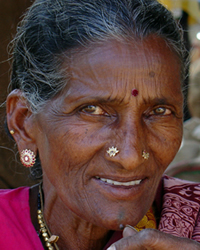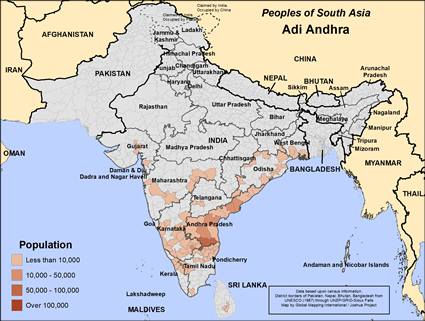The Adi Andhra are a scheduled caste of people living in south India and Sri Lanka. A scheduled caste means that they are disadvantaged and victims of past discrimination. As of 2001 only about 60% of the Adi Andhra could read and write at a basic level.
Beginning in the 20th century the Adi Andhra and other lower caste peoples started a reform movement to gain human rights and economic opportunities. The movement continues today. A small group of Adi Andhra has gained an education and become professionals. Some Adi Andhra have moved to cities to work in industry, improve their status and have their children attend school.
The main language of the Adi Andhra is Telegu, the language of Andhra Pradesh. It is a minority language in Sri Lanka.
The Adi Andhra like their name suggests, live the south Indian state of Andhra Pradesh. Some also live in the nearby states of Tamil Nadu and Karnataka. A smaller number live on the island nation of Sri Lanka.
Today most Adi Andhra are still landless, rural farm workers. Some also work as street sweepers, village watchmen and in the leather trade. Some women work as domestics.
The lives of the rural Adi Andhra are very challenging even by Sri Lankan standards. Often they are without electricity, access to clean water, indoor plumbing and modern medical care. They work in the fields from sunup to sunset with little hope for a better life. Their children must work in the fields to help support the family.
The Adi Andhra are endogamous, that is, they marry within their clan. Young people frequently marry their cousins. Families arrange the marriages. Sons inherit what little property they own.
Unlike most Hindus, the Adi Andhra will eat any type of meat they can obtain. The major portion of their diet is rice and any vegetables and fruit if they can afford it. Meat is a luxury for special occasions.
The vast majority of Adi Andhra are Hindu, the dominant religion and culture among their people in India and Sri Lanka. They worship and serve the numerous gods of the Hindu pantheon. The Adi Andhra give attention to the Hindu goddesses whom they believe can protect them from epidemics, evil spirits and famine. The Adi Andhra participate in the yearly Hindu holidays of Holi, the festival of colors, Diwali, the festival of lights and Navratri, the nine-day celebration of autumn. A few Adi Andhra are Buddhists, Sikhs or Christians.
The Adi Andhra need to hear the life-changing gospel of Jesus Christ in the way they can understand. They need help with their physical needs such as clean water and a regular source of healthy food. They need new business and educational opportunities so they can break out of their lives of poverty and hardship.
Pray for gospel workers to catch a vision for reaching the Adi Andhra people for Jesus and that in God's sovereign timing the hearts of the Adi Andhra people would be open and ready to follow Him.
Pray for Jesus movements to bless their extended families so the gospel will spread rapidly among this people group.
Pray for the spiritual lives of the Adi Andhra people to become fruitful as they follow Christ.
Pray for the lives and culture of the Adi Andhra people to evidence the rule and reign of the Kingdom of God as they open to the gospel, and for the beauty of Jesus to be seen in them.
Scripture Prayers for the Adi Andhra in Sri Lanka.
censusindia.gov.in/Tables Published/SCST/dh_sc_andhra.pdf
peoplegroups.org/explore/GroupDetails.aspx?peid=49197#topmenu
| Profile Source: Keith Carey |












